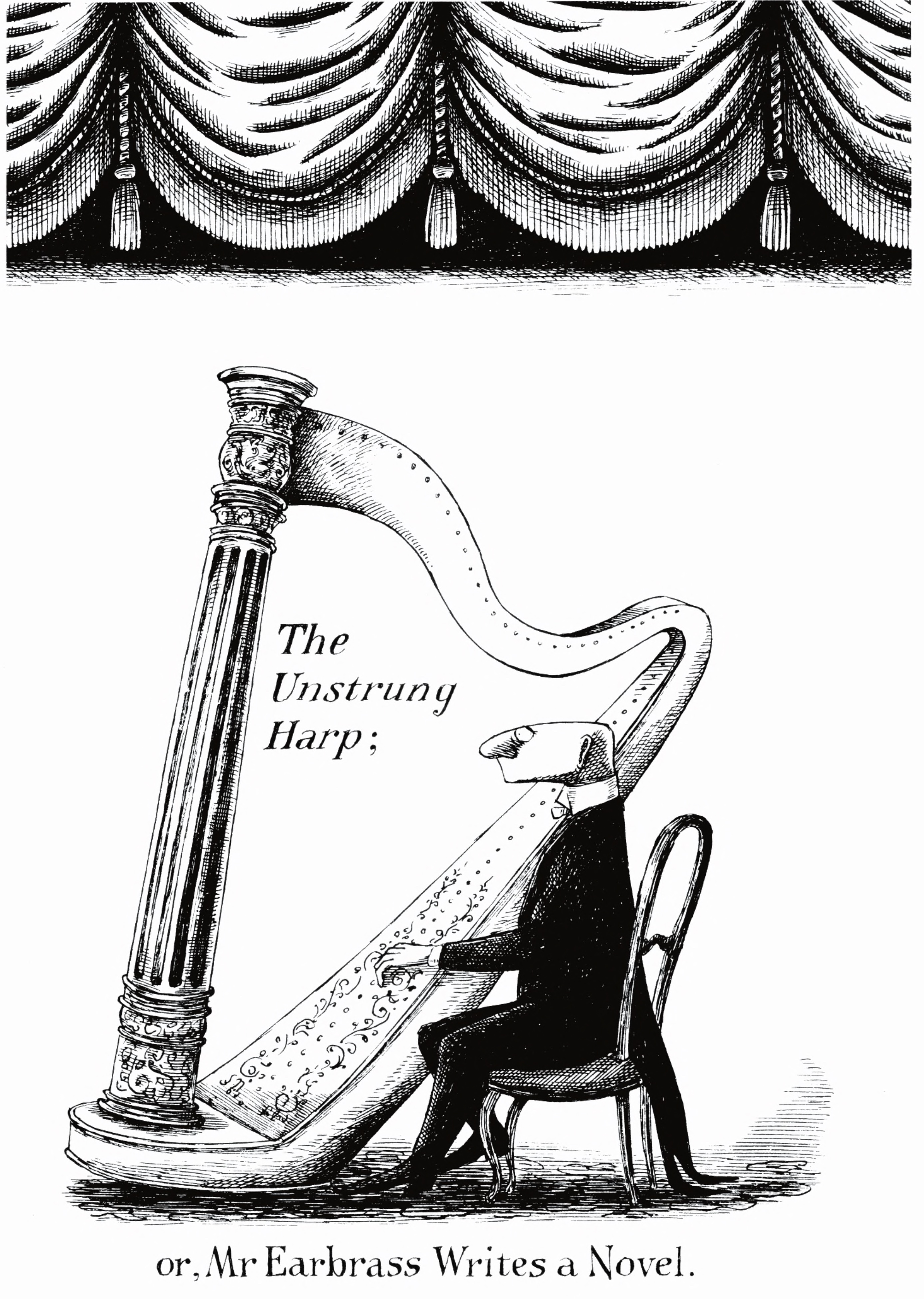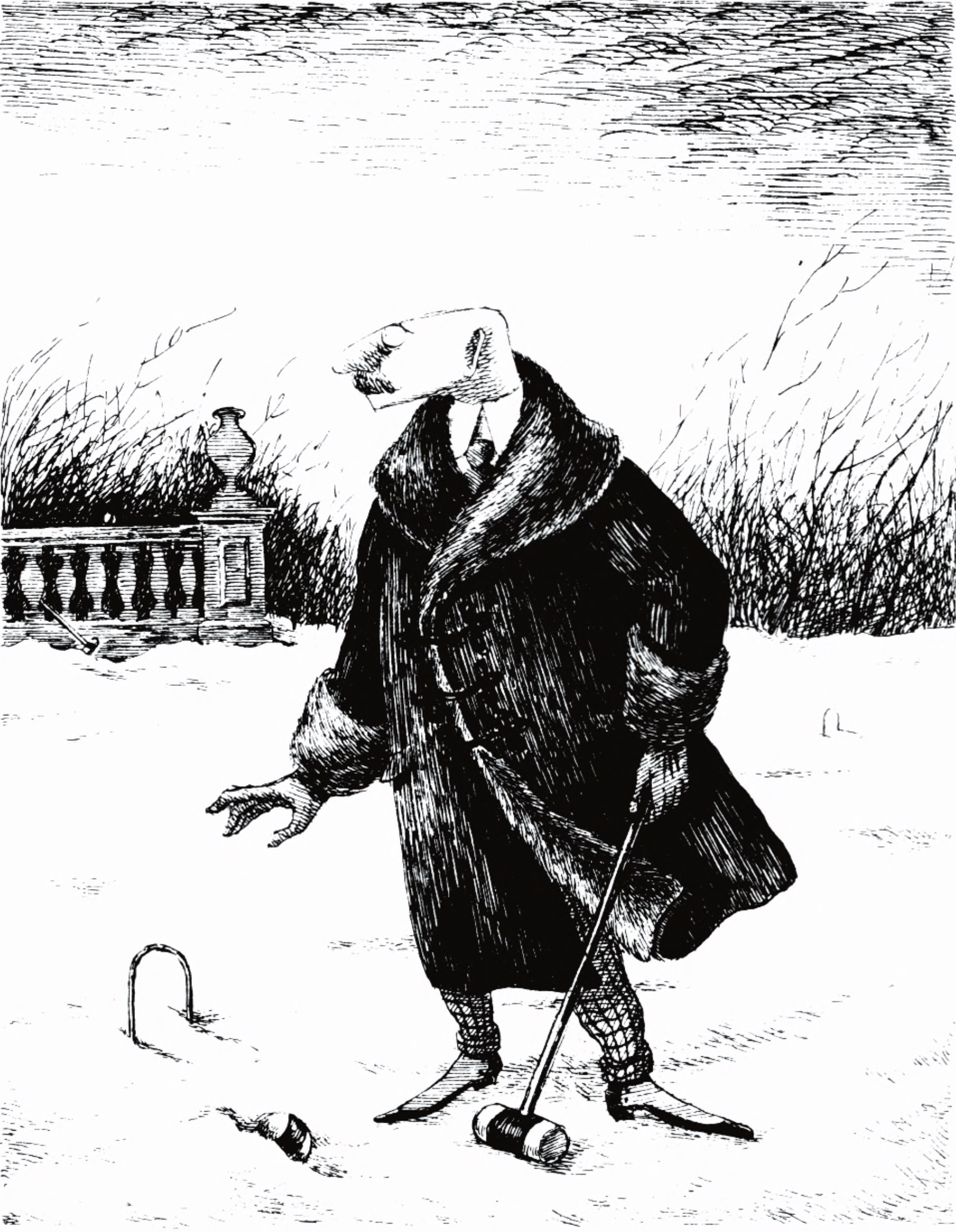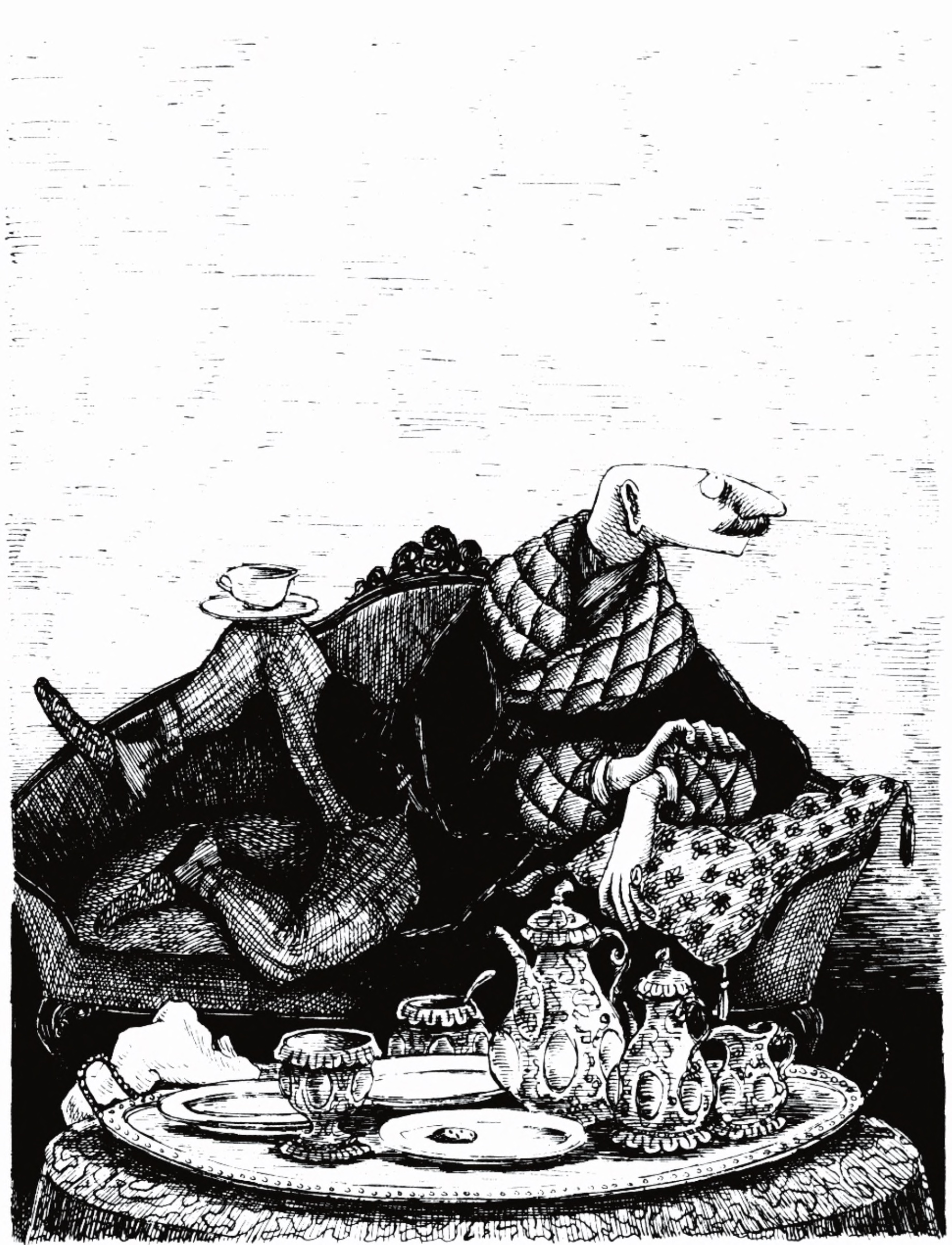Edward Gorey - The Unstrung Harp (full 50MB version)


(c) Edward Gorey, retrieved from archive.org . To imporove readability, keep the text moving up and down within the pictures.
Mr C(lavius) F(rederick) Earbrass is, of
course, the well-known novelist. Of his books,
"A Moral Dustbin", "More Chains Than Clank",
"Was it Likely?", and the Hipdeep trilogy are,
perhaps, the most admired. Mr Earbrass is
seen on the croquet lawn of his home,
Hobbies Odd, near Collapsed Pudding in
Mortshire. He is studying a game left
unfinished at the end of summer.
On November 18th ...

... biscuit on the plate.
On November 18th of alternate years
Mr Earbrass begins writing ‘his new novel’.
Weeks ago he chose its title at random from
a list of them he keeps in a little green
note book. It being tea-time of the 17th,
he is alarmed not to have thought of a plot
to which The Unstrung Harp might apply,
but his mind will keep reverting to the
last biscuit on the plate.
Snow was falling ...

... worn hind-side-to.
Snow was falling when Mr Earbrass
woke, which suggested he open TUH with
the first flakes of what could be developed
into a prolonged and powerfully purple
blizzard. On paper, if not outdoors, they
have kept coming down all afternoon,
over and over again, in all possible ways;
and only now, at nightfall, have done so
satisfactorily. For writing Mr Earbrass
affects an athletic sweater of forgotten
origin and unknown significance; it is
always worn hind-side-to.
Several weeks later ...

... dragged or not.
Several weeks later, the loofah trickling
on his knees, Mr Earbrass mulls over an
awkward retrospective bit that ought to
go in Chapter II. But where? Even the
voice of the omniscient author can
hardly afford to interject a seemingly
pointless anecdote concerning Ladderback
in Tibet when the other characters are
feverishly engaged in wondering whether
to have the pond at Disshiver Cottage
dragged or not.
Mr Earbrass belongs ...

... the Poddington Te Deum.
Mr Earbrass belongs to the straying, rather
than to the sedentary, type of author. He is
never to be found at his desk unless actually
writing down a sentence. Before this
happens he broods over it indefinitely
while picking up and putting down again
small, loose objects; walking diagonally
across rooms ; staring out windows ;and so
forth. He frequently hums, more in his
mind than anywhere else, themes from
the Poddington Te Deum..
It was one of Mr Earbrass’s ...

... better ideas.
It was one of Mr Earbrass’s better days; he
wrote for so long and with such intensity that
when he stopped he felt quite sick. Having
leaned out a window into a strong wind for
several minutes, he is now restoring himself
in the kitchen and rereading TUH as far as he
has gotten. He cannot help but feel that
Lirp's return and almost immediate impalement
on the bottle tree was one of his better ideas.
The jelly in his sandwich is about to get all
over his fingers.
The jelly in his sandwich ...

... over his fingers.
Mr Earbrass has finished ...

... no other character capable of them.
Mr Earbrass has finished Chapter VII, and
it is obvious that before plunging ahead
himself he has got to decide where the plot
is to go and what will happen to it on
arrival. He is engaged in making diagrams
of possible routes and destinations, and
wishing he had not dealt so summarily with
Lirp, who would have been useful for taking
retributive measures at the end of Part Three.
At the moment there is no other character
capable of them.
Out for a short drive ...

... TUB shifts to Hangdog Hall.
Out for a short drive before a supper of
oysters and trifle, Mr Earbrass stops near
the abandoned fireworks factory outside
Something Awful. There is a drowned sort of
yellow light in the west, and the impression
of desolation and melancholy is remarkable.
Mr Earbrass jots down a few visual notes
he suspects may be useful when he reaches
the point where the action of TUB shifts to
Hangdog Hall.
Mr Earbrass was virtually ...

... their authorship.
Mr Earbrass was virtually asleep when
several lines of verse passed through his
mind and left it hopelessly awake. Here
was the perfect epigraph for TUH:
A horrid ?monster has been [something]
delay’d
By your/their indiff’rence in the dank
brown shade
Below the garden...
His mind’s eye sees them quoted on the
bottom third of a right-hand page in a
(possibly)olive bound book he read at least
five years ago. When he does find them, it
will be a great nuisance if no clue is given
to their authorship.
Mr Earbrass has driven ...

... Angus?
Mr Earbrass has driven over to Nether
Millstone in search of forced greengages,
but has been distracted by a bookseller’s.
Rummaging among mostly religious tracts
and privately printed reminiscences, he
has come across The Meaning of the Mouse,
his second novel. In making sure it has
not got there by mistake (as he would
hardly care to pay more for it), he
discovers it is a presentation copy. For
Angus— will you ever forget the bloaters?
Bloaters? Angus?
The first draft of TUH ...

... vanish.
The first draft of TUH is more than half
finished, and for some weeks its characters
have been assuming a fitful and cloudy
reality. Now a minor one named Glassglue
has materialized at the head of the stairs
as his creator is about to go down to dinner.
Mr Earbrass was aware of the peculiarly
unpleasant nubs on his greatcoat, but not the
blue-tinted spectacles. Glassglue is about to
mutter something in a tone too low to be
caught and, stepping sideways, vanish.
Mr Earbrass has been ...

... room on the third floor?
Mr Earbrass has been rashly skimming
through the early chapters. which he has not
looked at for months, and now sees TUH for
what it is. Dreadful, dreadful, DREADFUL. He
must be mad to go on enduring the unexquisite
agony of writing when it all turns out drivel.
Mad. Why didn’t he become a spy? How does
one become one? He will burn the MS. Why
is there no fire? Why aren’t there the
makings of one? How did he get in the
unused room on the third floor?
Mr Earbrass returned ...

... deprived of novels.
Mr Earbrass returned from a walk to find
a large carton blocking the hall. Masses of
brow paper and then tissue have reluctantly
given up an unnerving silver gilt combination
epergne and candelabrum. Mr Earbrass
recollects a letter from a hitherto unknown
admirer of his work, received the week before;
it hinted at the early arrival of an offering
that embodied, in a different but kindred
form, the same high-souled aspiration that
animated its recipient’s books. Mr Earbrass
can only conclude that the apathy of the
lower figures is due to their having been
deprived of novels.
Even more harrowing ...

... twining up his ankles.
Even more harrowing than the first chapters
of a novel are the last, for Mr Earbrass anyway.
The characters have one and all become
thoroughly tiresome, as though he had been
trapped at the same party with them since
the day before; neglected sections of the plot
loom on every hand, waiting to be disposed of;
his verbs seem to have withered away and
his adjectives to be proliferating past control.
Furthermore, at this stage he inevitably gets
insomnia. Even rereading The Truffle Plantation
(his first novel) does not induce sleep. In the
blue horror of dawn the vines in the carpet
appear likely to begin twining up his ankles.
Though TUH is within ...

... out of his mind.
Though TUH is within less than a chapter
of completion, Mr Earbrass has felt it his
cultural and civic duty, and a source of
possible edification, to attend a performance
at Lying-in-the-Way of Prawne’s The Nephew's
Tragedy. It is being put on, for the first
time since the early seventeenth century,
by the West Mortshire Impassioned Amateurs
of Melpomene. Unfortunately, Mr Earbrass
is unable to take in even one of its five
plots because he cannot get those few
unwritten pages out of his mind.
In that brief moment ...

... belonged to someone else.
In that brief moment between day and
night when everything seems to have stopped
forgoodandall, Mr Earbrass has written the
last sentence of TUH. The room’s appearance
of tidiness and Mr Earbrass's of calm are
alike deceptive. The MS is stuffed all
anyhow in the lower right hand drawer of
the desk and Mr Earbrass himself is wildly
distrait. His feet went to sleep some time ago,
there is a dull throbbing behind his left ear,
and his moustache feels as uncomfortable as if
it were false, or belonged to someone else.
The next day ...

... more helpful.
The next day Mr Earbrass is conscious but
very little more. He wanders through the house,
leaving doors open and empty tea cups on the
floor. From time to time the thought occurs
to him that he really ought to go and dress,
and he gets up several minutes later, only to
sit down again in the first chair he comes
to. The better part of a week will have elapsed
before he has recovered enough to do anything
more helpful.
Some weeks later ...

... its original state.
Some weeks later, with pen, ink, scissors,
paste, a decanter of sherry, and a vast
reluctance, Mr Earbrass begins to revise TUH.
This means, first, transposing passages,
or reversing the order of their paragraphs, or
crumpling them up furiously and throwing
them in the waste-basket. After that there
is rewriting. This is worse than merely
writing, because not only does he have to
think up new things just the same, but at
the same time try not to remember the old
ones. Before Mr Earbrass is through, at
least one third of TUH will bear no
resemblance to its original state.
Mr Earbrass sits ...

... loathsome proceeding.
Mr Earbrass sits on the opposite side of the
study from his desk, gathering courage for
the worst part of all in the undertaking of a
novel, i.e., making a clean copy of the final
version of the MS. Not only is it repulsive to
the eye and hand, with its tattered edges. stains,
rumpled patches, scratchings-out, and scribblings,
but its contents are, by this time, boring to
the point of madness. A freshly-filled inkwell,
new pheasant-feather pens, and two reams of
the most expensive cream laid paper are
negligible inducements for embarking on
such a loathsome proceeding.
Holding TUH ...

... a good deal of fuss.
Holding TUH not very neatly done up in
pink butcher’s paper, which was all he could
find in a last-minute search before leaving
to catch his train for London, Mr Earbrass
arrives at the offices of his publishers to
deliver it. The stairs look oddly menacing,
as though he might break a leg on one of them.
Suddenly the whole thing strikes him as very
silly, and he thinks he will go and drop his
parcel off the Embankment and thus save
everyone concerned a good deal of fuss.
Mr Earbrass escaped ...

... put under a glass bell.
Mr Earbrass escaped from Messrs Scuffle
and Dustcough, who were most anxious to go
into all the ramifications of a scheme for
having his novels translated into Urdu, and
went to call on a distant cousin. The latter
was planning to do the antique shops this
afternoon, so Mr Earbrass agreed to join him.
In the eighteenth shop they have visited,
the cousin thinks he sees a rare sort of
lustre jug, and Mr Earbrass irritatedly
wonders why anyone should have had a
fantod stuffed and put under a glass bell.
The night before ...

... the literary life.
The night before returning home to
Mortshire Mr Earbrass allows himself to be
taken to a literary dinner in a private dining
room of Le Trottoir Imbécile . Among his fellow-
authors, few of whom he recognizes and none
of whom he knows, are Lawk, Sangwidge,
Ha’p’orth, Avuncular, and Lord Legbail. The
unwell-looking gentleman wrapped in a
greatcoat is an obscure essayist named
Frowst. The talk deals with disappointing
sales, inadequate publicity, worse than
inadequate royalties, idiotic or criminal
reviews, others’ declining talent, and the
unspeakable horror of the literary life.
TUH is over ...

... pecuniary limits.
TUH is over so to speak, but far from done
with. The galleys have arrived, and Mr
Earbrass goes over them with mingled
excitement and disgust. It all looks so
different set up in type that at first he
thought they had sent him the wrong ones
by mistake. He is quite giddy from trying
to physically control the sheets and at
the same time keep the amount of
absolutely necessary changes within the
allowed pecuniary limits.
Mr Earbrass has received ...

... Scuffle and Dustcough.
Mr Earbrass has received the sketch for the
dust-wrapper of TUH. Even after staring at
it continuously for twenty minutes, he
really cannot believe it. Whatever were
they thinking of? That drawing. Those
colours. Ugh. On any book it would be
ugly, vulgar, and illegible . On his book it
would be these, and also disastrously
wrong. Mr Earbrass looks forward to an
exhilarating hour of conveying these
sentiments to Scuffle and Dustcough.
Things contined ...

... his next book.
Things contined to come, this time Mr
Earbrass’s six free copies of TUH. There are,
alas, at least three times that number of
people who expect to receive one of them.
Buying the requisite number of additional
copies does not happen to be the solution, as it
would come out almost at once, and everyone
would be very angry at his wanton distribution
of them to just anyone, and write him little
notes of thanks ending with the remark that
TUH seems rather down from your usual level
of polish but then you were probably in a
hurry for the money. If it didn’t come out,
the list would be three times larger for
his next book.
To day TUH is published ...

... and pointless embarrassment.
To day TUH is published, and Mr Earbrass
has come into Nether Millstone to do some
errands which could not be put off any longer.
He has been uncharacteristically thorough
about doing them, and it is late afternoon
before he pauses in front of a bookseller’s
window on the way back to his car. Having
made certain, out of the corner of his eye,
a copy of TUH was in it, he is carefully
reading the title of every other book there
in a state of extreme and pointless embarrassment.
Scuffle and Dustcough have ...

... on page 33.
Scuffle and Dustcough have thoughtfully,
if gratuitously, sent all the papers with
reviews in them. They make a gratifyingly
large heap. Mr Earbrass refuses to be
intimidated into rushing through them, but
he is having a certain amount of difficulty in
concentrating on, or, rather, making any sense
whatever out of, A Compendium of the Minor
Heresies of the Twelfth Century in Asia Minor.
He has been meaning to finish it ever
since he began it two years and seven
months before, at which time he bogged
down on page 33.
At an afternoon ...

... very weak indeed.
At an afternoon forgathering at the
Vicarage vaguely in Mr Earbrass’s honor,
where he has been busy handing round cups
of tea, he is brought up short by Col Knout,
M.F.H. of the Blathering Hunt. He demands
to know just what Mr Earbrass was ‘getting
at’ in the last scene of Chapter XIV. Mr
Earbrass is afraid he doesn’t know what
the Colonel is. Is what? Getting at himself.
The Colonel snorts, Mr Earbrass sighs.
This encounter, which will go on for some
time and get nowhere, will leave Mr
Earbrass feeling very weak indeed.
Mr Earbrass stands ...

... mourning elsewards.
Mr Earbrass stands on the terrace at
twilight. It is bleak; it is cold; and the
virtue has gone out of everything. Words
drift through his mind: anguish turnips
conjunctions illness defeat string
parties no parties urns desuetude
disaffection claws loss Trebizond
napkins shame stones distance fever
Antipodes mush glaciers incoherence
labels miasma amputation tides
deceit mourning elsewards ...
Before he knew ...

... he is on the other side.
Before he knew what he was doing, Mr
Earbrass found he had every intention of
spending a few weeks on the Continent. In
a trance of efficiency, which could have
surprised no one more than himself, he
made the complicated and maddening
preparations for his departure in no time
at all. Now, at dawn, he stands, quite numb
with cold and trepidation, looking at the
churning surface of the Channel. He
assumes he will be horribly sick for hours and
hours, but it doesn’t matter. Though he is a
person to whom things do not happen,
perhaps they may when he is on the other side.